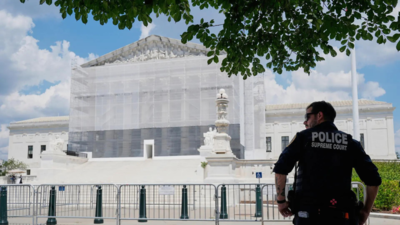
The US Supreme Court on Wednesday declined Florida’s request to allow the state to enforce parts of its new immigration law that had been blocked by a lower court, NBC news reported.The court's brief order did not explain why it refused the emergency request from Florida’s attorney general.The case centres on a law signed this year by Republican Governor Ron DeSantis that makes it a crime for someone to enter Florida if they previously entered the United States illegally or re-entered after being deported.Two immigration groups and two undocumented immigrants challenged the law in court. In April, US District Judge Kathleen Williams temporarily blocked the state from enforcing it.
Last month, she also held Attorney General James Uthmeier in civil contempt, saying he had tried to defy her order.A three-judge panel of the 11th US Circuit Court of Appeals refused to pause Judge Williams’ ruling and set an expedited schedule to hear the appeal in October.In documents to the Supreme Court, Florida argued its law aligns with federal immigration policy. The Trump administration, supporting Florida, argued the state law “complements” federal law and is nearly identical to federal rules about illegal entry and re-entry.
However, the American Civil Liberties Union (ACLU), representing the challengers, told the Supreme Court that similar state laws have been struck down in recent years. They also cited a 2012 Supreme Court ruling in Arizona vs United States, which said immigration enforcement is primarily a federal responsibility.Bacardi Jackson, executive director of the ACLU of Florida, welcomed the court’s decision.“This ruling affirms what the Constitution demands — that immigration enforcement is a federal matter and that no one should be stripped of their liberty without due process,” Jackson said.A spokesperson for Attorney General Uthmeier’s office said Florida will continue its appeal in the 11th Circuit.“Florida’s sovereignty cannot be left up to the whims of the next presidential administration,” spokesperson Jae Williams said, adding that the law is important for Florida’s future and needs to be upheld in the court.

 9 hours ago
47
9 hours ago
47




























 English (US)
English (US)